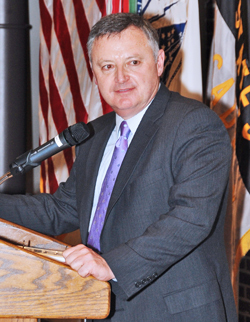Retired brigadier general Tom Kolditz spent the last 12 years running the leadership program he developed at West Point. His next challenge is to make over the men and women of Yale. So are leaders born, or made? Fast Company gets the definitive answer.

The first thing Tom Kolditz wants you to know about leaders is that most of them didn’t emerge from diapers to direct teams naturally. "If you look at the research done, the qualities leaders were born with, [such as] intelligence and attractiveness, account for 30 percent of leadership," says the retired brigadier general, who spent the last 12 years of his career running the leadership program he developed at the U.S. Military Academy at West Point.
"What that means is that 70 percent is learned--from your parents or the school of hard knocks or leader development programs. That's a big part that is malleable and attainable through training," he says. It's a good thing, too, as Kolditz prepares to take on a new teaching role at the Yale School of Management. Yale’s entire M.B.A program has been under construction over the past few years, beginning with the launch of a new curriculum and now on the countdown to open a new campus.
Though Yale’s SOM ranked #10 in a U.S. News and World Report survey this year, Dean Edward Snyder was committed to further redefine the leadership component, which had previously been a collective faculty responsibility, says Kolditz. "That was not as effective as having someone in charge," he explains (you don't say?). Just don’t expect him to be taking Yalies--who likely never set foot in bootcamp, much less a battlefield--skydiving, as he did with former students.
Kolditz, the author of In Extremis Leadership, says that while the military’s practical approach to leadership, especially in combat, "connects nicely with fast-paced, rapidly changing, high-stakes world of business," he anticipates "using very few exemplars," but the concepts will be the same. “It’s all about how to get things done in a dynamic environment.”
With Kolditz at the helm, the course of study will take place over the full two years of the program. “If you asked me before, I’d say why can’t I get three years?” he says, only partially kidding, “Changing people takes more time than most people are willing to admit.”
 It just won’t all be taken from textbooks. “Development isn’t solely a classroom endeavor,” explains Kolditz.
It just won’t all be taken from textbooks. “Development isn’t solely a classroom endeavor,” explains Kolditz.
To that end, the redesigned leadership program has just two actual classes--one in fundamentals and one on advanced leadership. The rest, he says, is a very individualized course of study that places a big emphasis on getting and giving feedback as well as spending a lot of time in guided reflection with professional coaches, faculty, and mentors.
Though the Army has doctrinal definitions, "there will be no standard definition of Yale leadership, because it means different things to different people in different cultures," Kolditz says. "Each individual has to decide how they are going to approach their own development so they can influence people they way they want.”
Because of the diversity of the student body--30 percent of students are international, and graduates will go on not just to business but to social sectors--first year students will spend a lot of time planning their own personal leadership practicum, charting their own aspirations and goals for 6-10 years, and plotting their own approach to well-being in physical, spiritual, relationship terms.
Once the second year rolls around they’ll be required to execute their practicum, either through counseling in the career development office, leading a team of 8 first year students (for a grade by the team!) or running a practice business. It’s a lot to pack into 20 months, but Kolditz says, “With the knowledge we give them there is no question we will be able to move their needle. I don’t know anyone else who is doing it.”
With the rising need of top-level executives in emerging markets, Kolditz says it’s also essential that students get cross-cultural training. “You don’t even have to get out of the U.S. to know that working with people in Tennessee is very different than working with people in New York City. You amplify that when you fly across oceans,” he says. Living in Germany and Korea for several years taught him that you can't just treat everyone the same. "Leadership is not just a style that you are comfortable with, people don’t care about that. They want to be influenced." So another requirement that will set Yale M.B.A.s apart is the time students must spend overseas (during spring break) learning by observing the way people in other parts of the world conduct negotiations.
As for his own leadership and teaching style, incoming students can rest assured he’s not going to make anyone drop and give him 20 for failing to meet expectations. “I wasn’t the general, even in the Army,” says Kolditz with a chuckle. “I tend to be engaging and sort of light hearted and very practical in the classroom without a lot of formality.”
This low-key approach is evident from the moment he introduces himself as “soldier/scholar mutt” who draws from the time he’s spent running organizations with teachable theory. “I won’t speak to something that I can’t bring in an example that’s particularly personal. I think that’s good in a leadership development context because it really helps to have someone who is a scholar but can draw on their experience,” he explains.
Many of his students come to the program with real-world experience, too, something that West Point cadets lacked. "We are really going to be able to do some great things because of that," he says, looking forward to the start of the semester. But Kolditz makes it clear the students will be doing all the heavy lifting. "They will have ownership and accountability of their own development," he says, because when they get ready to launch their own businesses they have to be in charge. "We are looking to build a leader identity. The biggest shift will be in how they view themselves."
[Image: Flickr user Straman]